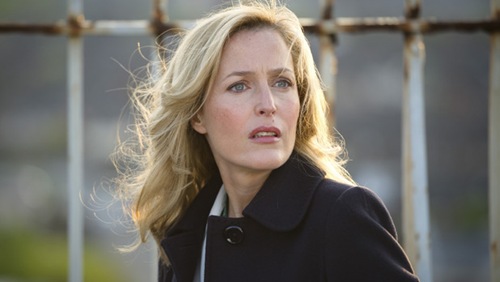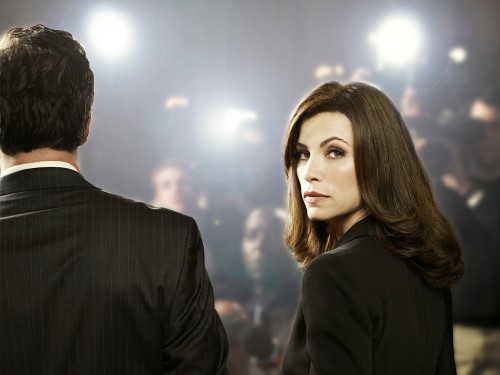Written by Katherine Murray.
The lead character in BBC’s The Fall is impervious to fear, but that’s OK. She’s doing the modern detective’s work of making us all feel safe in a world that’s anything but.

The second season of The Fall just finished airing on the BBC and, while there’s been a slow decline in quality since the series premiere, it remains one of the only detectives shows – if not the only detective show – to acknowledge that violence against women is a built-in feature of patriarchal cultures rather than a random, strange coincidence. (Rebecca Solnit has a good essay about this in Men Explain Things to Me, if you want to get mad.)
The Fall is about serial killer named Paul Spector and Stella Gibson, the Gillian Anderson-looking detective who hunts him down. In his own mind, Paul is a dark, fascinating genius who’s playing a clever game of cat and mouse with the Irish police force. In almost everyone else’s mind, he’s a loser who hates women, and the police figure out who he is almost as soon as they start looking.
What makes The Fall an amazing piece of television is that it spits in the face of conventional serial killer narratives. Rather than being fascinated with Paul and how tortured and interesting he is, it’s focussed on how his hatred of women fits into a larger societal pattern, and how the lessons we learn about gender inform our beliefs and behaviours in life. It can be heavy-handed, but it’s also refreshing because it’s so different from the narrative we most often see.
The show spends roughly equal time on Spector and Gibson, but it’s Gibson we’re supposed to cheer for, and Gibson who’s built up as the ideal feminist woman. In the middle of a show full of terrifying, realistic, often heart-wrenching violence against women, Gibson’s there to make us feel safe. Not only because we know she’s going to catch Paul Spector and put him behind bars, but because she is completely and utterly awesome at everything. Perhaps unbelievably so.
The main source of tension in The Fall comes from fear and vulnerability. Watching the show, as a woman, you have the same chilling thought you have, as a woman, every time you’re walking alone at night, or hear a sound in your house while you’re sleeping: “What would I actually do if someone attacked me right now?” And the answer, if you’re honest, is that, even if you learned some krav maga one time, you would be just as terrified and just as dead as one of Spector’s victims.
The fear that men will attack us is something women carry around 24/7; it’s always simmering in the back of our minds, and The Fall forces us to look at it directly. In the middle of that horror, like a lifeline, or a warm blanket, Gibson the Terribly Competent stands impervious to fear. She can’t be intimidated by a bunch of tough guys on the street; she doesn’t freeze in an emergency; she can’t be made to feel ashamed for having sex; she breaks your nose if you don’t back off when she tells you to; she isn’t scared of some guy in a bar, or some guy in a limo, or even some guy who chokes other women to death. She looks at those guys with contempt and moves on with her life, without thinking the problem is her. No matter what, we know, she’s going to be OK.
It’s not actually unusual for the hero of a genre story to be hypercompetent. Like, we all understand that Jason Bourne is not realistic, right? And the guy from Mission Impossible? And that one detective from True Detective who said that time was round like a beer can? He was also improbably good at things.
What interests me about Gibson isn’t that it’s weird for the hero to be competent – it’s that, in this instance, her competence speaks to me and comforts me in way that Rust Cohle didn’t manage. She reminds me of another detective I like.

Appropriately, since Veronica Mars is set in high school, the tension in that story’s less about the fear of being killed and more about the fear of public humiliation. And Veronica, its hero, is impervious to all embarrassment.
In The Fall, it’s been implied that Gibson may have been assaulted at some time in the past, and that that’s what motivates her to work with female victims of violence. In Veronica Mars, it’s made explicit from the start that Veronica was the victim of the cruellest forms of high school bullying before she became the cynical, hypercompetent girl we know.
Whenever someone tries to insult, intimidate, or make fun of her, she has a snappy comeback to put them down. Whenever someone seems to get the upper hand against her, she manages to turn the tables somehow, making them look foolish in her place. In maybe the most blatant example, some popular boys she’s investigating put her name on the karaoke list in an attempt to embarrass her and make her back off. With only seconds to think it over, Veronica jumps up and sings the Blondie song “One Way or Another,” turning potential humiliation into a triumph as literally no real person could do.
Knowing that Veronica’s going to land on her feet whenever someone tries to bully her has the same warm blanket effect as knowing that Gibson can’t get scared. It’s not entirely realistic – for all of us, life involves at least some moments of fear and humiliation – but it gives us safe harbour in stories that are otherwise designed to make us anxious. In these particular contexts, Gibson and Veronica always know what to do, and the things they do always work. They allow us to confront the things that make us anxious with the safety net of knowing that it’s going to be OK.
And, if you’re going, “Katherine, that’s what all detectives do,” you’re sort of right.

Part of the point of detectives – at least modernist, soft-boiled detectives – is that they bring order to chaos and therefore restore our sense of safety. When Sherlock Holmes became popular, in Ye Olde Victorian England, it was in a context where urbanization, industrialization, and the expansion of the British empire had made people feel uncertain about what was happening. The world was changing really fast, there were a bunch of strangers around, and it felt like some random person could just murder you or steal your stuff and disappear into the crowd. (From a more racist point of view, it also seemed like a wizard from India could slip some potions in your tea, but that’s a different discussion from this.)
The calming figure of that era was a man with the superhuman ability to piece together tiny bits of information, and an encyclopaedic knowledge of literally everything that ever was, including scary foreign cultures. He was the safe harbour in the storm of modern living.
Flash forward about 100 years, and the same hero is reincarnated as House, a doctor who knows what’s wrong with you even when Web MD has no idea. Like Sherlock Holmes, House taps into our general fear that there is too much information for any one person to crunch. And, in a world where we are terrified that everything from our water bottles to our genes is trying to kill us in new, incomprehensible ways, the House version of Sherlock Holmes provides some safety, because House can see the pattern, House can understand what’s happening, and House can make some order out of chaos. Even if the MRI machine makes all your veins explode exactly in time for commercials, House will have the answer by the end.
The comfort of watching Gibson is both similar and different to the comfort of knowing that puzzles get solved. It’s the comfort of saying, “There’s someone who looks like me and, day to day, is not afraid to be alive. Someone who lives in the world I live in, that’s full of the terrors I face, and – realistically or not – is showing me what it could be like if I didn’t have to be scared.”
It’s a powerful counterpoint to the Man Kills Loads of Women – Is Special, Tortured Genius story that Spector thinks he’s starring in. This is Woman Is Not Afraid to Walk Down the Street; Woman is Not Afraid to Say No; Woman Isn’t Worried That She’ll Be a Total Drag if She Points Out What a Sexist Jerk You’re Being. It’s a different kind of fantasy than Knowing Lots or Solving Things – it’s Having a Right to Exist, opposite the story of a man who chokes women to death to feel strong. It’s the writers consciously and deliberately preventing this from being a story where you should have carried some mace to the bathroom, if you didn’t want to get killed in your house.
What’s different about Gibson isn’t that she’s extra specially good at stuff – it’s that the forces she’s facing off against are specifically aimed at women. The fear that she’s shielding us from is a fear that most men don’t carry around. The Fall, in its graphic and terrifying depictions of violence, would be unbearable to watch if Gibson wasn’t always at the centre, reminding us what life would be like if we didn’t have to feel afraid.
Different monsters require different kinds of heroes to defeat them. Gibson is the right kind of hero to face this kind of monster, and the strength of The Fall may be that it’s the first show to know which monster we’re trying to fight.
Katherine Murray is a Toronto-based writer who yells about movies and TV on her blog.






